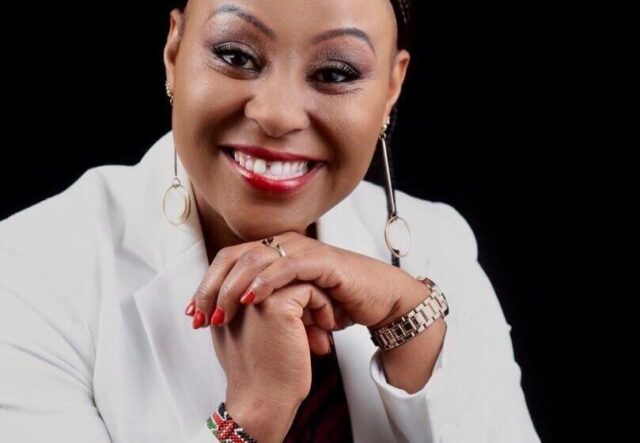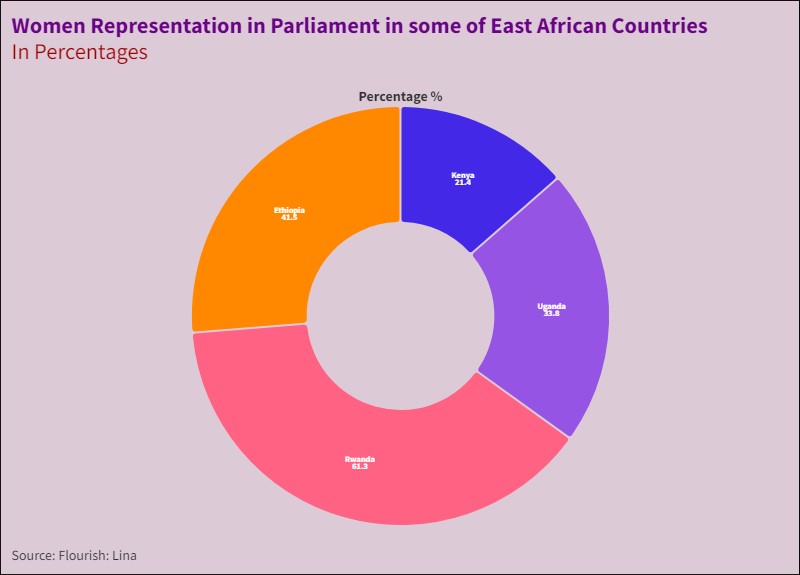
More women vied for different political seats in Kenya during the 2022 general election.
Challenges like discrimination, body shaming, name calling, financial constraints and political parties’ bias toward women were also visible during the last general election. The exchange of money for votes made it even worse. Despite numerous challenges, women still pushed onto the ballot as this feature explores.
It was a chilly evening as faint rays of sun penetrated the clouds, an indication of sunset fast approaching, I slowly walked to the home of the former Commercial Bank of Kenya deputy governor Jacinta Mwatela in Taita Taveta County.
Joyfully she welcomed me and immediately embarked on talks regarding women and leadership, alas! With a wide smile, she opened up about the challenges she encountered as a woman seeking gubernatorial leadership in the county in both the 2013 and 2017 general elections.
Jacinta cited that the Kenyan Constitution doesn’t focus on gender when it comes to matters to do with leadership, instead, it looks at integrity, personal determination and accountability of an individual, be it male or female.
Irene Mjomba who once vied for a member of the county assembly seat in Chawia Ward Taita Taveta County, also doubles up as an activist for women and girls’ rights, openly talks of challenges she faced as a female candidate.
Irene didn’t mince her words, quickly she told me what she had to bear with during the campaign period, during the 2022 general election in Kenya, from shortage of finances to name calling and discrimination.
However, she spoke and shared some of the possible solutions to having many women in top and local level leadership as their male counterparts.
According to Ms Mjomba, societal mentality about women’s leadership, women embracing fellow women and parties financing and endorsing women candidates will be a game changers to women leadership.
Ms Mjomba is of the view that if many women are elected into leadership positions, women’s and girls rights will be realised and be tackled well unlike how men treat and take lightly issues to do with women and girls.
Unlike previous years, more women have come out boldly to vie for different leadership positions.

Women who vied for different political seats in the 2022 general election in Kenya. Photo/Lina Mamachi
In the last general election in 2022, Taita Taveta saw two women challenging men in the gubernatorial seat, and the majority running for members of parliament and county assembly seats, giving men a run for their money.
Lack of finances, discrimination, insults and women being looked down upon, are among the challenges that women candidates have had to contend with while contesting for different civic and political seats in Kenya.
Is there a long-term solution that will ensure more women are elected to positions rather than await nominations?
Patience Nyange vied for a gubernatorial seat in Taita Taveta County last year during the 2022 general election. She urges women to come out in large numbers to box it out with men.
According to Patience, leadership is for everyone, with strong policies and integrity and not an issue to do with gender, adding that embracing equity and integrity will bring super solutions to women’s leadership.
Patience sentiments are echoed by Jacinta Mwatela and Irene Mjomba, all affirming that choosing a good leader in any position shouldn’t be tied to gender.
Geoffrey Kimonge, a local political analyst says it’s time for women to come out in large numbers to contest for different positions of leadership to avert nomination positions.
Mr Kimonge says it’s incredible for women to come out to fight for different leadership positions with male counterparts, as a way of killing the notion that women deserve nominations seats and not elective seats.
Haki Afrika, a human rights organisation cites that a woman is a vital organ in leadership and all spheres.
Lilian Anzazi is the coordinator for human rights in the Haki Afrika organisation in Taita Taveta County, she says that women have done well since time immemorial in family upbringing, schooling and community-level leaderships, so should not be subjected to being weak and incompetent.
Ms Anzazi adds that there should be equality between men and female in leadership positions at all levels, without dwelling in the heaviness of their pockets.
A new report, published by the National Democratic Institute (NDI) as well as the Federation of Women Advocates in Kenya (FIDA), indicated that women made huge strides in terms of politics and leadership, during the last polls.
The same report adds that, in the whole of Kenyan history, 29 per cent of women vied for different leadership positions in 2017, than in past elections in the country, whereas, more women were elected as senators and governors.
The report continues to proclaim that women hold 172 seats out of 1,883 seats, all the way up from 145 seats which they acquired during the 2013 general election.
However, despite the milestones reached by women in leadership, the report cites that, challenges are still many which are posing as barriers for women to stretch further in terms of leadership positions, thus hindering them from attaining a third gender threshold in Parliament.
According to the report, to reach and surpass third-gender rule in Kenya, collective positive efforts are required from all stakeholders, including Parliament, Ministries, gender task forces, judiciary, electoral bodies, gender organisations, human rights bodies and many more.
Otherwise, the report sums up challenges women faced including being sidelined by parties, lack of funds, discrimination, stereotypes, culture, body shaming and name vilification.
Strides made by women
Kenya has seen women like Charity Ngilu, the late Wangari Maathai, who was the first African woman to win a prestigious Nobel Peace Prize and Martha Karua vie for the presidency, although unsuccessful, the efforts and steadfastness, tell it all that women are also able leaders.
During the August 2022 general election in Kenya, no woman vied for a presidential seat, and we had three women, Martha Karua, Ruth Mutua and Justina Wamae running as female deputy presidents.
A courageous move is yet to be established in the presidential category, where women are yet to stamp their authority and stand their ground to wrestle it out with male fellows.
The 2022 General Election saw an increase in the number of women who threw themselves in the ring and vied for gubernatorial positions and pushed it much higher to seven.
However, women did well in their capacities, where we also got 12 women, deputy governors, 3 women senators, 30 women members of parliament and 47 women representatives, adding to a total of 99 women altogether.

According to NDI, male and female legislators must work together to solve myriad problems in their respective countries, to meet worldwide development goals and build strong, sustainable democracies whereas women must be encouraged, empowered and supported in becoming strong political and community leaders altogether.
In the 2022 polls, all the political parties put in place mechanisms to bolster the participation of women in elections, like lowering the nomination fee for women candidates relative to their male counterparts. This is a commendable initiative from the political parties although much has to be done.
Consequently, in the past election in 202, the number of women elected still fell below the constitutional threshold as 30 women were elected to Parliament, representing 8.6 per cent women’s representation in Parliament.
This is attributed to not just the absence of a legislative framework but also cultural, financial, and political barriers and violence that still threatens the aspiration of women’s participation in the political space.
Sadly, Kenya is trailing the neighbouring East African Community (EAC) in women’s political representation, with 21.4 per cent of women members of Parliament.
As reported by KIPPRA, Kenya Institute for Public Policy Research and Analysis Rwanda had 61.3 per cent, Uganda had 33.8 per cent, and Ethiopia 41.5 per cent.

The United Nations stresses the need for countries to promote women’s participation in democracy and leadership plus being part of decision-making. Experts urge that democracy acts as an incubator for gender equality and is interlinked and, therefore, it is important to bridge the gap in the democratic participation of women in elections and leadership.
Therefore, it is foreseen that much can be done to meet the provisions of the Constitution in ensuring that women are fairly and equally represented in the political institutions, if Kenya is to attain the aspirations envisaged in the Constitution of Kenya 2010, regarding leadership and required threshold in the parliament.
Meanwhile, Jacinta Mwatela, Patience Nyange and other female leaders all insist that candidates as well as electorates should embrace unity and shun away from handouts from politicians, if leadership change is anything to go by, without being coerced by the influential with money or gender, incitement or discrimination.
The late political scientist Madeleine K. Albright said, for women, violence is not a rightful or inevitable cost of participation in politics, but participation in politics is the way we end violence against women.
This story is part of the African Women in Media (AWiM)/Luminate Young Women in Politics Media Project













